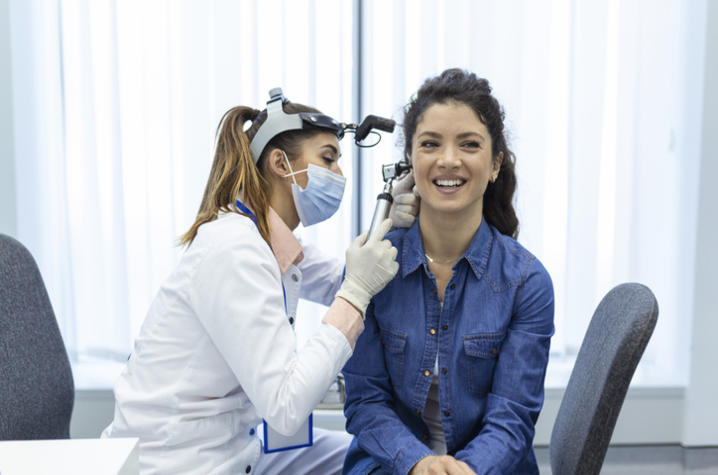Having trouble hearing? When to seek help for hearing loss

The University of Kentucky Public Relations and Strategic Communications Office provides a weekly health column available for use and reprint by news media. This week's column is by Jennifer Shinn, Ph.D., chief of audiology and professor in the Department of Otolaryngology at the University of Kentucky.
LEXINGTON, Ky. (Dec. 4, 2023) — Hearing loss can occur when any part of the ear or hearing system is not working correctly. The National Institutes of Health (NIH) estimates that 37.5 million American adults ages 18 and older report some trouble hearing.
Types of hearing loss
It’s important to know the different types of hearing loss and when to seek medical care for hearing.
Conductive hearing loss occurs when sound is unable to travel correctly from the outer ear through to the inner ear. This can be caused by wax, ear infections or other issues like a hole in the eardrum or abnormalities of the bones within the middle ear.
Sensorineural hearing loss involves damage to the inner ear, hearing nerve and/or brain. This type of hearing loss is often caused by aging or noise exposure.
Patients who have a combination of both conductive and sensorineural are considered to have mixed hearing loss.
Hearing loss is usually gradual but in certain instances can be sudden. If sudden, a patient should seek medical care immediately.
Leading causes of hearing loss
For children, genetics accounts for 50% of hearing loss. It can also be caused by intrauterine infections such as cytomegalovirus, lack of oxygen at birth, severe jaundice, extended NICU stay, chronic middle ear fluid and infections, meningitis and chemotherapy.
Adult hearing loss is often age-related. The NIH determines age as the strongest predictor of hearing loss among adults aged 20 to 69. The greatest amount of hearing loss is seen in the 60-69 age group.
There are many things that may cause hearing loss. Common factors that may cause hearing loss include noise exposure, genetics, viral infections and damage to the eardrum.
Common signs and symptoms of hearing loss
Hearing loss can occur in different ways, but some common symptoms may include the following:
- Asking people to repeat themselves.
- The perception that people are mumbling.
- Difficulty hearing in noisy environments.
- Listening to the television or radio at increased levels.
- General increased difficulty with communication.
- Social isolation.
- Ringing in the ears (tinnitus).
- Sensitivity to loud noises.
Anyone who suspects a decline in hearing should be evaluated by a specialist. An audiologist is the primary health care provider who evaluates, diagnoses and manages hearing loss and hearing balance disorders. Audiologists will diagnose the type and degree of hearing loss and provide recommendations for treatment options.
Hearing loss treatment
When medical and surgical management is not indicated, treatment for a patient’s hearing loss can often be managed by hearing aids. This is a non-surgical option. The NIH reports that 28.8 million U.S. adults could benefit from using hearing aids.
Cochlear implantation is a surgical option for patients who don’t benefit from hearing aids.
If you suspect you have hearing loss, contact an audiologist for a hearing evaluation.
UK HealthCare is the hospitals and clinics of the University of Kentucky. But it is so much more. It is more than 10,000 dedicated health care professionals committed to providing advanced subspecialty care for the most critically injured and ill patients from the Commonwealth and beyond. It also is the home of the state’s only National Cancer Institute (NCI)-designated Comprehensive Cancer Center, a Level IV Neonatal Intensive Care Unit that cares for the tiniest and sickest newborns and the region’s only Level 1 trauma center.
As an academic research institution, we are continuously pursuing the next generation of cures, treatments, protocols and policies. Our discoveries have the potential to change what’s medically possible within our lifetimes. Our educators and thought leaders are transforming the health care landscape as our six health professions colleges teach the next generation of doctors, nurses, pharmacists and other health care professionals, spreading the highest standards of care. UK HealthCare is the power of advanced medicine committed to creating a healthier Kentucky, now and for generations to come.




